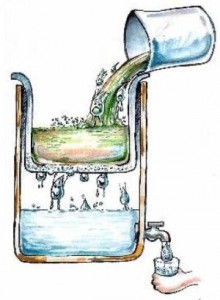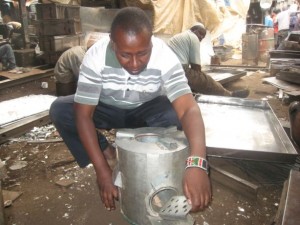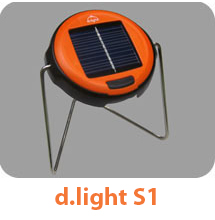Why Sanitation Business Is Good Business | Source: Forbes, Jan 28, 2013 |
“Sanitation is more important than independence,” Mahatma Gandhi said in 1925. In 2006, Ashoka Fellow David Kuria decided Gandhi was right—improving sanitation by thinking beyond the toilet became his chosen mission. In this post, Nikki and Rob Wilson explore why David’s innovation has been so successful in urban settings.
Going to the toilet while you’re traveling in Africa is not an experience you look forward to. To be totally frank, it can be so bad that invariably it makes you gag. But in Kenya, ask anyone for the nearest “Ikotoilet” and all your dreams come true. For just five shillings (pennies on the dollar) you get to do your business in a spick-and-span public loo. What’s more, once you’re done you can top up your phone, buy a cold Coke or get your shoes shined.
David Kuria, an Ashoka Fellow since 2007, launched the social business Ecotact to challenge toilet taboos and make sanitation sexy. Sound a bit crazy? Not one bit. Poor sanitation kills millions every year and David’s “toilet talk” strategy is saving lives. “I wanted to re-invent the whole sphere,” David told us, totally disenchanted by tokenistic toilet-building.
After hours of hard graft and research, the Ikotoilet concept was born, and with it, three core objectives that have guided widespread shifts in health and hygiene:
Objective 1: Transform the architecture of the toilet
An architect by training, David believes all buildings should be beautiful. “No one has given any thought to the toilet as a piece of art,” he said to us, not even breaking into a smile. Determined to prove that with beauty comes respect, David purposefully designed every block of toilets to be a striking landmark. Using funky shapes and bright colors, it’s fair to say the Ikotoilet isn’t easily missed. What’s more, both the staff and the customers take time to keep the loos in great condition, proving David’s mantra that if you build something beautiful, people will want to take care of it. 
Objective 2: Implement a business model that disrupts the status quo
For just five schillings, an affordable price for all, the general public can go to an Ikotoilet and access clean, safe and hygienic sanitation facilities—services that before Ikotoilet simply didn’t exist. This might not sound revolutionary but here’s the twist. The Ikotoilet block is also known as a “Toilet Mall.” The space surrounding the loo block is rented to local businesses that provide a range of services like hair cutting, shoe shining and money transfer. Drawn in by the opportunity to advertise to a captive audience, bigger businesses also pay for wall space to promote their brands.
Income from entry fees, rent revenue and advertising deals covers all the overheads of each Ikotoilet and leaves enough left over to repay David’s investment loan. In fact, within five years, each Toilet Mall will be turning a tidy profit. Aside from being a nice little money-making scheme, the beauty of this model is that it removes the stigma around stinky toilets, creating instead a space where communities can convene. In turn, this places important pressure on the Ikotoilet staff to keep their standards high and their facilities 100 percent stench free!
[click to continue…]










